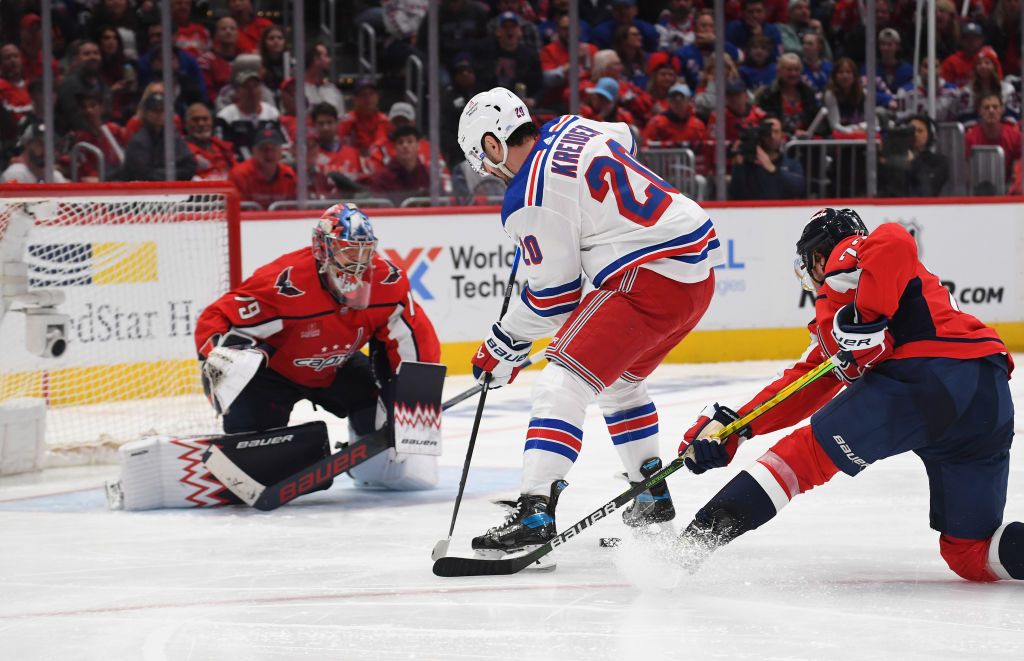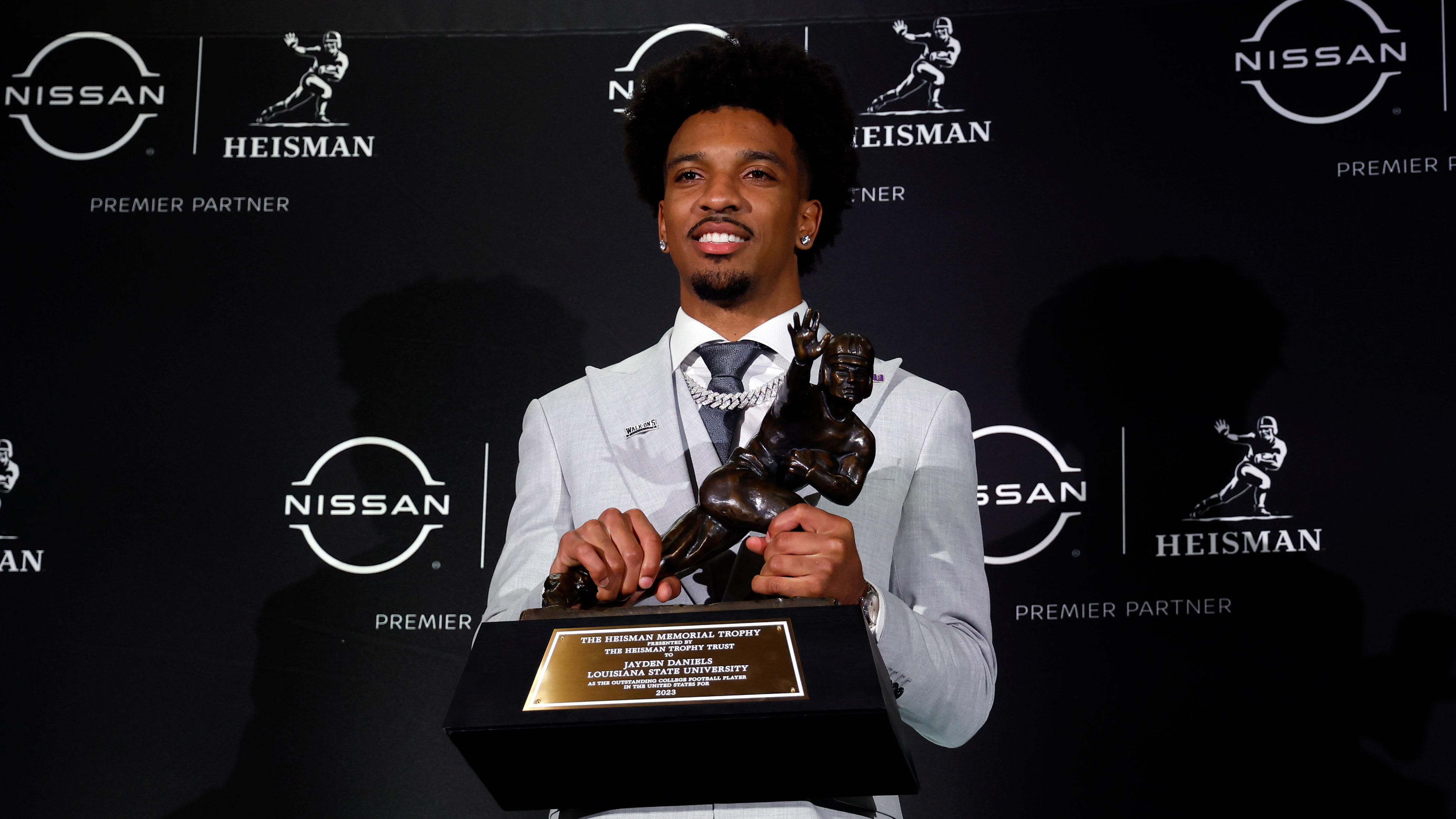With the Capitals' 2013-14 season over, the time has come to reflect on the year that was. Throughout the week, I will examine the Capitals by position. Part II focuses on the bottom six.
Joel Ward
- Career-high 25 goals, 49 points in 82 games
Ward was easily Washington's feel-good story of the season. The 33-year-old came a long way from being trapped in a Dallas bathroom stall, setting career highs in goals, assists and points.
The coaching staff began relying heavily on Ward and entrusting him with newfound responsibility, featuring him more prominently on both the power play (1:45 of ice time per game) and penalty-killing units (1:49 per game). Ward thrived at even strength, where he and linemates Eric Fehr and Jason Chimera combined for 42 goals on a team that struggled mightily in that aspect.
The key for Ward will be replicating this season's performance next season -- the final year of a four-year, $12 million contract -- while also translating his personal success into team-wide success.
Capital Games
Capital Games is your source for all Washington-area sports.
“There were a lot of personal bests for me," Ward said. "It’s been a long up and downs from being stuck in the bathroom to scoring 20-plus goals. It’s kind of bittersweet a little bit. It was a good year for myself personally and some other players too, but you always want to get in and play for that trophy.”
Jason Chimera
- Fifteen goals, career-high 42 points in 82 games
Oates routinely referred to Chimera and Ward as the "twins," an apt description considering that the duo spent more than 80 percent of their even-strength ice time together. Chimera's speed and tenacity combined with Ward's ability to grind and win battles along the boards proved to be incredibly successful as both earned career-best seasons offensively.
Chimera and Ward flanked several centers on the third line this season, but they formed the nucleus of what was Washington's most consistent unit during five-on-five play. While they saw just 47.7 percent of shots head towards the opposing net when on the ice together, their game plan was simple and effective: cycle, work the puck down low and create scoring chances from in tight.
Chimera, who scored 14 of his 15 goals at even strength, rebounded from a disappointing lockout-shortened 2012-13 season by quintupling his goal-scoring production. He was also the team leader in even-strength points with 36 on the season.
With a two-year, $4 million contract set to begin next season, similar outputs will make such an investment worth it for Washington.
Eric Fehr
- Thirteen goals, 31 points in 73 games
Fehr was thrust into a completely foreign role this season, switching to center after playing his entire career on the wing. The transition was not without its growing pains (particularly in the faceoff circle, where he won 46 percent of his 426 draws, 404 more than he had taken in his career prior to the season), but the versatile nine-year veteran embraced the change.
Tasked with more responsibility that naturally comes with the center position, Fehr became a more complete player in all three zones. Fehr was one of the Capitals' better forwards at driving possession (49 percent Corsi percentage) and the positional change forced him to develop his playmaking ability.
“I think it went pretty well, better than I expected definitely,” Fehr said. “I’m not exactly sure what to expect for years to come, but as of right now I guess I’m a centerman, so I’ll continue working on it and trying to get better.”
Jay Beagle
- Four goals, nine points in 62 games
Typically a bottom-six grinder, Beagle saw time on all four lines this season. His largest impact was actually felt in the top six, where he centered Alex Ovechkin in the midst of a playoff chase.
The curious partnership, as one might have expected, did not pay off. Beagle and Ovechkin played together for over 109 minutes at even strength and did not earn a single point between them. The duo did not prevent the opposition from scoring either; the Capitals allowed 1.463 goals per 20 minutes when Beagle and Ovechkin were on the ice together, a significant uptick from their respective totals when apart.
Regardless of the results, the 28-year-old relished the opportunity to play in more high-pressure situations against stiffer competition.
“It was fun, because it’s an opportunity that not many people get to have -- playing with one of the greatest goal-scorers in the league,” Beagle said. “It was an opportunity that I wanted to run with and wanted to absorb and play my hardest and just make sure I don’t let an opportunity go to waste because you don’t get many opportunities to play, especially when I’m a fourth- or third-line centerman, to play a top-six role.”
Of course, when returned to his customary position on the fourth line, Beagle scored twice in a 4-0 victory against the Chicago Blackhawks on April 11. For lack of a better term, Beagle's doggedness is best suited for a bottom-six role.
Tom Wilson
- Three goals, 10 points in 82 games; one of three NHL rookies to appear in all 82 games
As previously stated, Wilson was one of three NHL rookies to appear in every game this season. The other two -- Colorado Avalanche forward Nathan MacKinnon and Tampa Bay Lightning forward Tyler Johnson -- are Calder Trophy frontrunners. Wilson, though certainly not as skilled as either of the aforementioned rookies, did not provide similar production due in large part to never receiving an opportunity to do so.
The Capitals drafted Wilson 16th overall in 2012 hoping that he would one day develop into a versatile forward with skill and snarl, but the rookie saw 7:56 of ice time per game exclusively on the fourth line.
With Ovechkin, Troy Brouwer and Ward ahead of him on the right-wing depth chart, Wilson was never going to receive an increased role. Yet as evidenced by his March 14 goal assisted on by forward Evgeny Kuznetsov, Wilson provided some proof that he could fit right in playing alongside more skilled linemates.
Where Wilson left his mark was in the fighting department; the 20-year-old participated in 14 fights, fourth-most in the NHL. Wilson, however, ultimately realized that dropping the gloves could only be one facet of his game and not the foundation. That awareness will serve him well as he continues to grow.
Oates regularly insisted that retaining Wilson instead of returning him to his junior team was the best decision for his development. An argument could be made that Wilson may have been better off in the Ontario Hockey League, but only time will tell if the bruising forward will evolve into the well-rounded player that Washington envisioned he could become.
Dustin Penner
- One goal, three points in 18 games with Capitals (14 goals, 21 assists in 67 total games for Capitals/Ducks)
After acquiring Penner from the Anaheim Ducks for a fourth-round draft pick on March 4, general manager George McPhee said that such a deal was too enticing to pass up.
It seemed that McPhee had a point; Penner was a two-time Stanley Cup champion whose net-front presence could complement the finesse of Ovechkin and Nicklas Backstrom on the first line much like Mike Knuble once did.
Apparently Oates did not agree, acknowledging that the hulking winger was "not the fastest guy in the world" and stashing him on the fourth line instead. This after Penner spent over 75 percent of his even-strength ice time in Anaheim playing alongside star forwards Ryan Getzlaf and Corey Perry.
Penner eventually settled on the second line with Brouwer and Marcus Johansson, but he was largely ineffective and often invisible regardless of where he was slotted in the lineup.
"I’ve played fourth line on other teams," Penner said. "I just play the position I’m given. I don’t worry about where I think I should be or where my dad thinks."
Asked where his father thinks he should play, Penner answered bluntly.
"First-line left winger," he deadpanned.
An unrestricted free agent this summer, Penner will likely attempt to fulfill his father's wishes elsewhere.
Aaron Volpatti
- Two goals in 41 games
The only eye-popping statistic that can be attributed to Volpatti is that his 39.5 percent Corsi percentage ranked 563rd of 570 NHL players who appeared in at least 41 games, making him one of the worst puck-possession players in the league.
Volpatti, who was hampered by a left shoulder injury, played just one game following the Olympic break. This may not be the most opportune time to mention that he is under contract for one more season.
Follow Adam on Twitter @AdamVingan and e-mail your story ideas to adamvingan (at) gmail.com.



